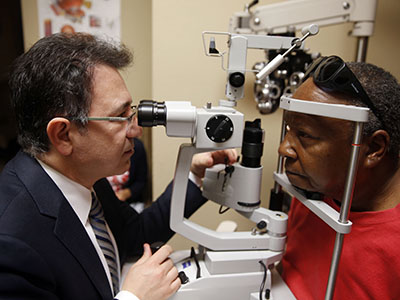Dr. Jack Abrams and his staff at the Abrams Eye Institute often get questions from patients about their eyes and aging, and what happens as they get older. This installment of the series looks at eyes and care for those in their 50s. For the full eyes and aging series, click here.
As you you enter your 50s, the lens inside your eye become even less flexible, and the result is a harder time focusing on objects that are close. You’ll also find an increased need for light to read. The combination presents especially clearly in restaurants with small type on their menus, and low light offered to read them.
In your 50s, you’ll also notice more of your friends wearing glasses and bifocals. This occurs as eyes begin to weaken and wearing contact lenses may be more challenging with eyes being drier than they were when you where younger.
Things becoming more challenging to read, and you and your friends relying on assistance to read and see in other situations in life are totally normal and happen to almost everyone. The key is to make sure that eye health challenges that are not normal are monitored closely with regular eye exams and closer attention paid by you to your eyes. Self monitor can be important if you have increasing trouble with your vision, pain in your eyes, or anything else that doesn’t seem normal. If that occurs, have your eyes checked.
As you get into your 50s, glaucoma, cataracts and macular degeneration can enter the picture. This is where an eye surgeon like Dr. Jack Abrams can help. Surgical techniques and technology improve all the time, and you need a team like the Abrams Eye Institute that has unique access to these techniques on your side.
As noted before a serious eye issue that presents in your 50s is glaucoma. You can detect glaucoma by checking and seeing if your side-to-side vision has decreased. This is caused by abnormally high pressure inside your eye. Tests given in annual exams can detect glaucoma, and while it is not yet curable, early detection and treatment can save your vision. We also recommend that you take care of cataracts to improve vision. Laser surgery can make a big difference in your vision.
If you have any question about your eyes and aging, eligibility for treatment options, such as laser cataract surgery, feel free to call us 702-304-9494 or use our on-site form.


